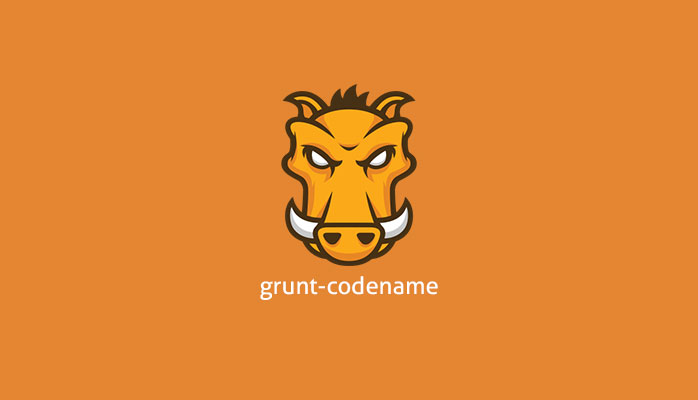
Utility to include a codename for your application based on version (up-to v10.X.X-X).
This works great alongside version bump utility: grunt-bumpx for keeping your version numbers and names up-to-date with each build.
Included codenames and patch names created with the help of the excellent codenamegenerator.com website.
It's nothing new
This was created by us in late 2013 and has had over 1,500 downloads to date, but as we've just released the Gulp.js version “gulp-codename”, it made sense to publish this as well.
Example
The utility will create a codename and a patch name based on your version number.
Version "0.0.1" will generate:
”codename": "Perseus Amber"
”patchName": "Saiga"
So; effectively your version is "0.0.1 Perseus Amber (Saiga)".
Version "0.0.2" will generate:
"codename": "Perseus Amber"
"patchName": "Ithomiid"
So; effectively your version is "0.0.1 Perseus Amber (Ithomiid)".
There is no patch name for "0" ("X.X.0") so Version * “0.1.0”* will generate:
"codename": "Bronze Marklar"
"patchName": ""
So; effectively your version is "0.1.0 Bronze Marklar".
Source code
To view the source; check out the git repository:
https://github.com/scriptwerx/grunt-codename
Getting started
This plugin requires Grunt ~0.4.1
If you haven't used Grunt before, be sure to check out the Getting Started guide, as it explains how to create a Gruntfile as well as install and use Grunt plugins. Once you're familiar with that process, you may install this plugin with this command:
npm install grunt-codename --save-dev
Once the plugin has been installed, it may be enabled inside your Gruntfile with this line of JavaScript:
grunt.loadNpmTasks('grunt-codename');
The project follows the SemVer guidelines for version numbers; specifically following: ‘1.2.3-1’ being ‘MAJOR.MINOR.PATCH-BUILD’.
N.B. The supplied codenames and patch names only include support for single-digit numbers used for minor and patch of the version field (and major up to 10) - you must supply your own custom codenames and patch names if you can't handle this restriction (but that's a lot of names)!
The "codename" task
Overview
In your project's Gruntfile, add a section named ‘codename’ to the data object passed into ‘grunt.initConfig()’.
grunt.initConfig({
codename: {
options: {
// Task-specific options go here.
},
src: [
// Target-specific files go here.
]
}
})
codename allows to set the codename and patchName based on the version number of the configuration files (package.json, manifest.json, etc.) in your project. Only JSON files are supported, and each file must have a ‘version’ field compliant to SemVer guidelines; specifically following: ‘1.2.3-1’ being ‘MAJOR.MINOR.PATCH-BUILD’.
Remember: The supplied codenames and patch names only include support for single-digit numbers used for minor and patch of the version field (and major up to 10) - you must supply your own custom codenames and patch names if you can't handle this restriction (but that's a lot of names)!
Example JSON
codename is designed to update your package.json, manifest.json or any other JSON file with a "version" field (configured as noted above).
An example of a manifest.json file is below:
{
"name": "My Test Application",
"version": "1.3.2-16",
"codename": "",
"patchName": "",
"description": "A test application for me."
}
Once codename has been used (with patch names enabled); the manifest.json file would be updated automatically as follows:
{
"name": "My Test Application",
"version": "1.3.2-16",
"codename": "Honiara Nimitz",
"patchName": "Ithomiid",
"description": "A test application for me."
}
Options
- patch: (Boolean) false - Generate a name for the patch version as well as the main codename.
- data: (File) undefined - Use custom JSON file for the codenames (and patchNames as required).
- codenames: (Object) undefined - Use a custom object for codenames.
- patchNames: (Object) undefined - Use a custom object for patchNames.
Default Options
Running the task in this way, the ‘codename’ field of each source file will be automatically changed to the correct codename for the build release.
grunt.initConfig({
codename: {
src: ["package.json", "manifest.json"]
}
})
Custom Options
Running the task in this way, the ‘codename’ and ‘patchName’ fields of each source file will be changed to the correct codename and patch name for the next minor release based on the names contained within the user-supplied codenames.json file.
grunt.initConfig({
codename: {
options: {
patch: true,
data: grunt.file.readJSON ("codenames.json")
},
src: ["package.json", "manifest.json"]
}
})